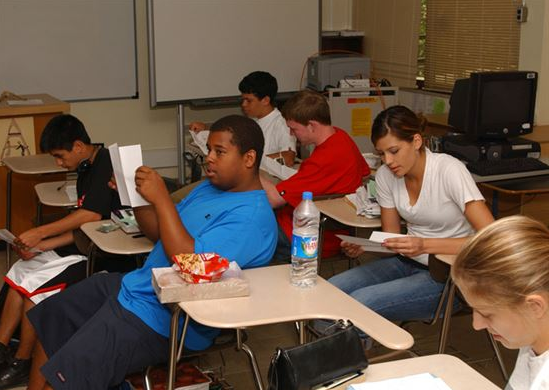My colleague Devin Foley recently had a high school literature assignment come across his desk. As he explains so aptly here, the assignment did not touch on any of the ideas contained in classic literary works; instead, it asks students to research modern, social-justice related issues, such as Black Lives Matter, Confederate statues, and gender identity and report their findings in a 3-4 page paper.
The teacher later retracted the assignment and apologized, but it would appear that similar assignments are becoming par for the course in high school English classes.
One can certainly put these assignments in a positive light. After all, they encourage critical thinking, provide the opportunity to engage with issues of our time, and also create the potential to understand the world in which we live.
But are these outcomes ones which should be the goal of a high school literature course?
One of the foremost literary thinkers and writers of modern times would give a decided “no” to that question.
In a 1944 essay for The Spectator, C.S. Lewis laid out what a truly good English literature course should do. He says:
“The true aim of literary studies is to lift the student out of his provincialism by making him ‘the spectator,’ if not of all, yet of much, ‘time and existence.’”
At first blush, one might jump to the conclusion that getting students to think, research, and write about social justice is doing just that: pulling a student out of his “provincial,” backwoods, narrow-minded ways. The trouble is, the social justice mentality is largely one of our own time and making, and as such, the intense focus on it drives a student into narrow-minded mentality rather than out of it. Lewis explains:
“The student, or even the schoolboy, who has been brought by good (and therefore mutually disagreeing) teachers to meet the past where alone the past still lives, is taken out of the narrowness of his own age and class into a more public world. He is learning the true Phaenomenologie des Geistes [The Phenomenology of Mind by Hegel]; discovering what varieties there are in Man.”
In other words, a truly good literary course will not keep the student focused on the ideas of the present; rather, it will broaden the mind by introducing students to the literary works and ideas which have gone before.
Many might think that this is the job of history courses, not literature. But Lewis explains why this mentality is an error:
“‘History’ alone will not do, for it studies the past mainly in secondary authorities. It is possible to ‘do History’ for years without knowing at the end what it felt like to be an Anglo-Saxon earl, a cavalier, an eighteenth-Century country gentleman. The gold behind the paper currency is to be found, almost exclusively, in literature. In it lies deliverance from the tyranny of generalisations and catchwords.”
The exploration, study, and reference to the past is often belittled these days. We have, it is implied, moved on to bigger and better methods and ideas. The thought that we would look to the allegedly narrow ideas of the past to broaden our modern minds – and teach our children to do the same – is anathema.
But is looking to learn from the past the societal link that we are missing? Are we, as Lewis implies, getting ourselves stuck in a mental, cultural rut when we fixate only on modern, social justice-related issues while cutting our students off from the insights of the past?
[Image Credit: U.S. Air Force photo by Airman 1st Class Tim Taylor]
















1 Comment
Beth Swan
September 21, 2024, 10:32 amI like Christopher Rufo's video on our "Cluster B" society. The lack of logic and classical theory is fueling this mental breakdown. C. S. Lewis rightly said, "What are they teaching in schools these days?"
REPLY